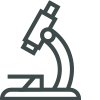Steven Altschuler (Milton E. Cassel Scholar) came to biology by way of pure mathematics, computer science and electrical engineering. He obtained an undergraduate degree in mathematics from the University of Pennsylvania and a Ph.D. under Richard Hamilton at the University of California, San Diego, working at the intersection of differential geometry, topology and nonlinear partial differential equations. With his longtime collaborator Lani Wu, Altschuler left the mathematics faculty at Princeton University to join the fledgling research division at Microsoft, where they founded a number of research efforts, including projects in video compression, semantic search, and speech/noise separation from multi-microphone input. Prior to arriving at UCSF, Altschuler and Wu were at Rosetta Informatics, fellows at the Bauer Center for Genomics Research at Harvard University, and associate professors at The University of Texas Southwestern Medical Center.
In their joint lab, Altschuler and Wu make use of experiment, quantitative data analysis, modeling and theory to investigate fundamental questions about the origins and impact of cellular heterogeneity in cellular decision-making, tissue development and homeostasis. Results from these studies are applied to investigate mechanisms of drug resistance, cancer evolution and new therapeutic strategies. The lab investigates fundamental questions about the origins and impact of cell-to-cell differences in the context of homeostatic tissue maintenance of healthy tissue and deregulation of diseased states. A common theme is the combined use of single-cell perturbation assays, quantitative imaging, data-driven modeling and theory, which is empowered by a multidisciplinary approach and team. Through the lens of cellular heterogeneity, the lab investigates the development of complex tissues (systems biology), disease progression (cancer systems biology) and drug discovery (systems pharmacology).
